15+ Sample Values Checklists
-
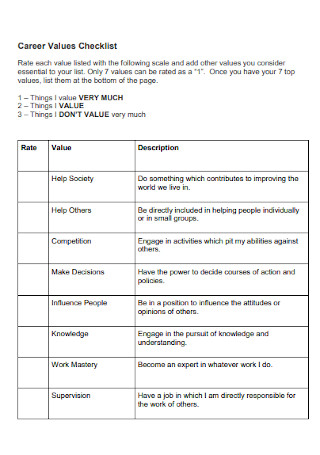
Career Values Checklist
download now -
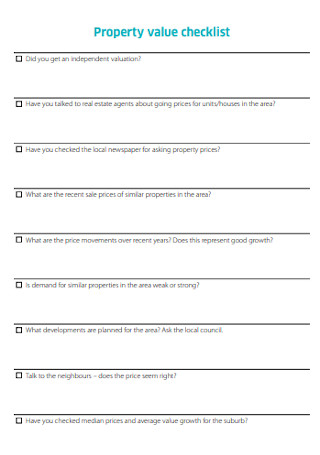
Property Value Checklist
download now -
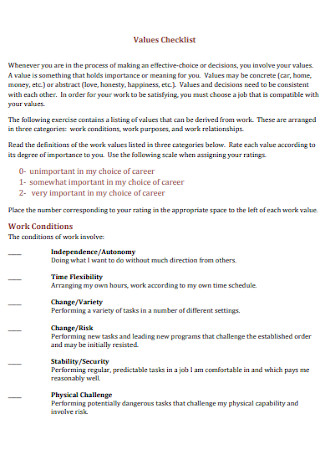
Sample Values Checklist Template
download now -
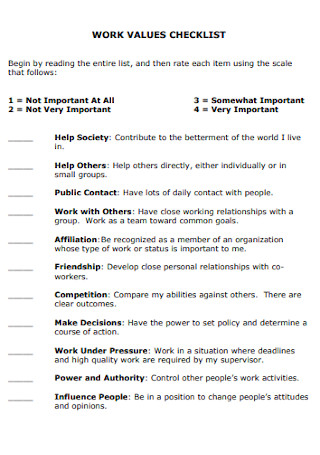
Work Values Checklist Template
download now -
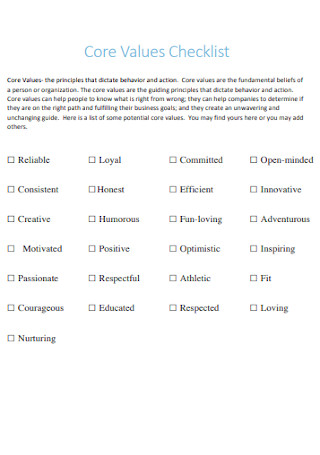
Core Values Checklist
download now -
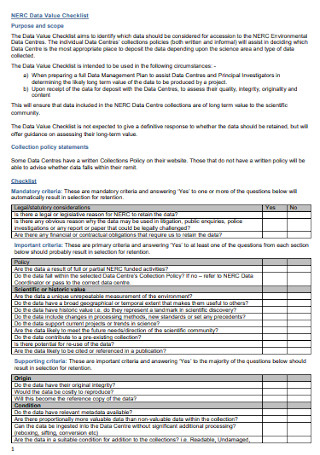
Data Value Checklist
download now -
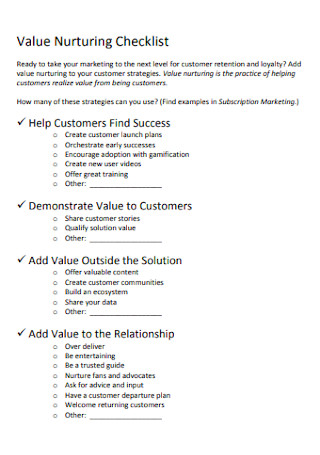
Value Nurturing Checklist
download now -
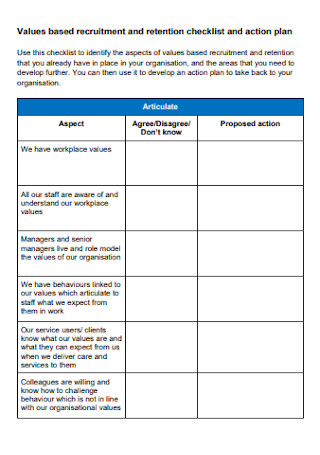
Values Based Recruitment Checklist
download now -

FastTrack Drive Value Checklist
download now -
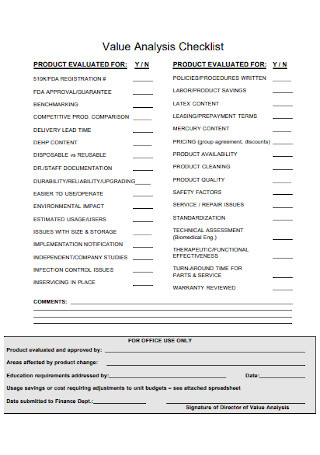
Value Analysis Checklist
download now -
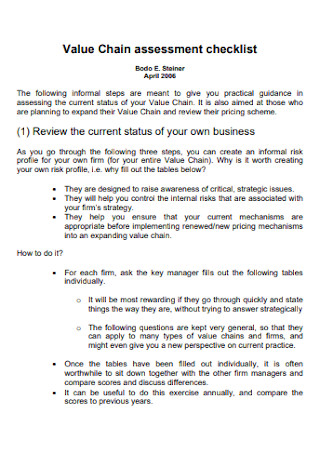
Value Chain Assessment Checklist
download now -
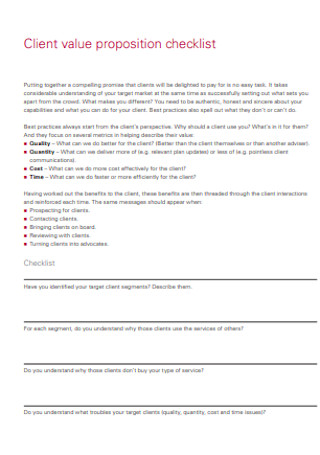
Client Value Proposition Checklist
download now -
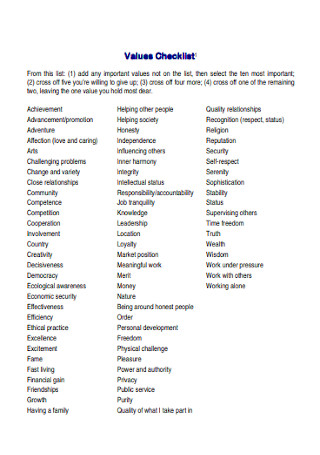
Basic Values Checklist Template
download now -
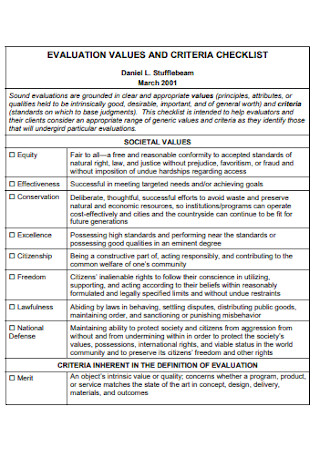
Evaluation Value Checklist Template
download now -
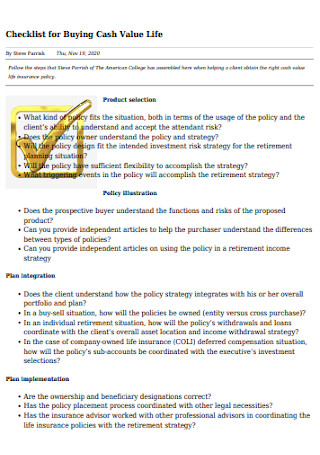
Checklist for Buying Cash Value
download now -
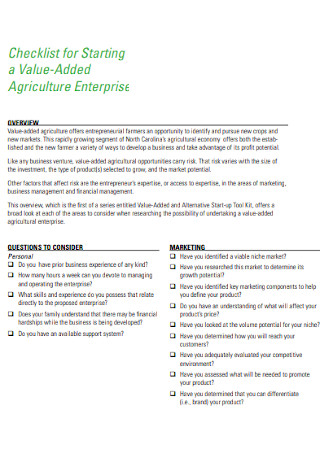
Agriculture Value Checklist
download now
What Is a Values Checklist?
A values checklist is a comprehensive checklist that enumerates an individual or organization’s core values and principles. The values checklist is meant to provide direction in a person’s life and influence their decision-making.
According to a report by Gallup, 77% of Americans agree that the state of moral values in the United States country is getting worse. This view has been consistently negative ever since 2002. In the same report, around half or 51% of those 65 years and older believe moral values are in a poor state; while 33% of respondents aged 34 and younger agree.
Where Should Values Be Applied?
Values will only work if they are applied in the right areas. There are different aspects wherein values and principles are important. From one’s personal affairs to professional life to everything in between, core values serve as the foundation that individuals can anchor themselves on. The following are just some major areas wherein values ought to apply.
Examples of Core Values
There are dozens of core values that drive individuals and organizations alike. What matters is that you find values that reflect your authentic self then commit yourself to its principles. The following examples describe just a few of these essential core values.
How to Create a Values Checklist
To create a values checklist, you must not discount the importance of introspection and self-awareness. As mentioned in previous sections, knowing yourself is crucial to knowing what principles you value the most. And if you are looking for editable templates that will help make a values checklist, refer to the collection of available templates above. Choose one that suits your needs and follow the basic steps below.
Step 1: Reflection
Before you begin making your checklist, you need to set aside time to really reflect on what you deem to be your highest values. This does not come easy or happen overnight. It takes a keen sense of awareness, introspection and the ability to be honest and vulnerable with oneself. Reflect on your past experiences and significant moments in your life when your values were either tested or they were able to shine through. Take note that your values may change over time and get rearranged according to what season you are in life. Upbringing, environment and personal experiences all contribute to the formation of an individual’s values.
Step 2: Format
Once you have a clear idea of what your core values are, you need to establish the format. You can have a traditional checklist or a modified one. How simple or detailed your checklist is will depend entirely on you and your needs. In the case of core values, you can give a brief description or explanation below each item on your checklist. You can also include checkboxes, bullet points or any symbols and characters of your choice. Refer to the sample checklists above for more ideas and inspiration.
Step 3: Checklist
Since it is a values checklist, you need to list down your core values. You can prioritize and arrange your values in any order you see fit. In most cases, core values are arranged according to importance or significance. Your checklist can be as short or long as you want it to be as well. Most values checklists are no more than a couple of pages. It can be quite helpful to arrange your values starting with the most important or primary value. The first value usually dictates the nature of the subsequent values. To illustrate, if your primary core value is honesty, then accountability and transparency are also related values you can incorporate into your checklist.
Step 4: Declaration
Once you have completed your list of core values, the last step is crafting a formal declaration of your dedication to it. This section is optional, of course. But if you want to remain steadfast in your values and principles, you need to be constantly reminded of it. The commitment to your core values will be the deciding factor if it is to be a sustainable and long-term journey. It does not need to be a lengthy or complicated statement. A simple, honest and straightforward statement summarizing your commitment to your core values should suffice.
FAQs
What are the 3 different types of values?
According to Winning Futures, values can be classified into three different types. These are character values, work values and personal values.
What are my 5 most important values?
To know what your most important personal values are, you need to take the time to reflect and take a good look at yourself internally. What are the things that matter to you the most? What principles are your actions based on or influenced by? These are the kinds of questions you need to ask yourself and reflect upon.
What are the 6 work values?
There can be many work values that people internalize. Work ethic and values greatly depend on individual circumstances and preferences. Examples of common work values include service, respect for others, honesty, collaboration, autonomy, and innovation.
Core values help ground you and direct you towards better decisions and choices. It can be applied in all aspects of your life, in both personal and professional affairs. Browse the free and editable templates above for more ideas on how to create your own values checklist!
